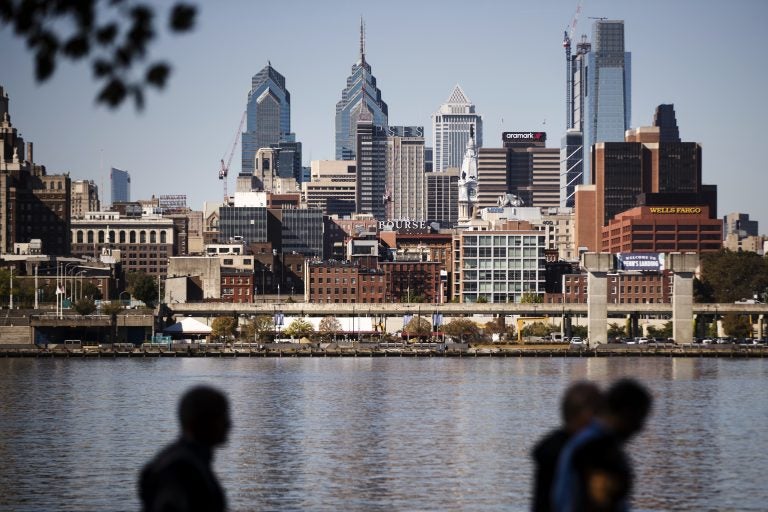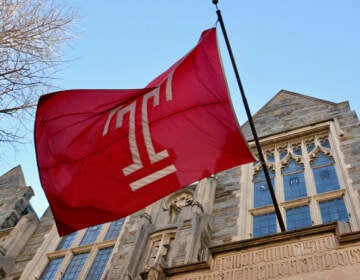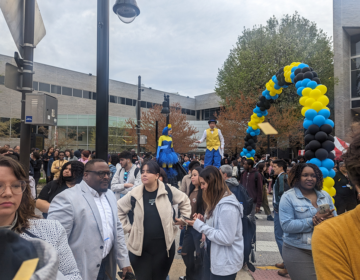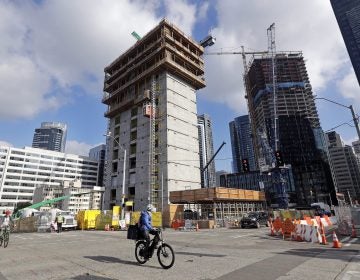To land Amazon, we must shift academic programs to meet workforce needs
With Philadelphia among the cities vying for Amazon’s second headquarters, it’s a perfect time to analyze whether our students are prepared for tomorrow’s workforce.

The Philadelphia skyline is seen along the banks of the Delaware River, Wednesday, Oct. 18, 2017. (Matt Rourke/AP Photo)
With Philadelphia’s campaign to be the location of Amazon’s HQ2 — and the prospect of adding 50,000 new jobs to the region — now is the time to analyze how well our colleges, universities, and K-12 schools are preparing students for tomorrow’s workforce.
I think it is fair to say that some leaders in education and industry have employed a traditional mindset in considering how to develop the skill sets and capabilities of new hires and current employees who are eager to advance. We have often lacked coordination and synergy across systems and funding streams and have opted to approach the work of education with rather singular, myopic thinking. In doing so, we have lost focus on the bigger picture. Alignment between education and workforce is not an option; it is a requirement and, accordingly, necessitates a non-traditional approach that emphasizes collaboration, partnership, and systemic impact.
This kind of synergistic, non-traditional approach to education was precisely what was described at a panel discussion at Peirce College earlier this month. A panel of thought leaders from education, business, and philanthropy engaged in a candid conversation about how we, as a city and region, can become a more robust, aligned engine. Our panel included leaders from Comcast and AmeriHealth Caritas, as well as School District of Philadelphia Superintendent Dr. William Hite, and Peirce President Jim Mergiotti. All agreed there is a pronounced need for seismic changes in how we think about the education continuum, from pre-K to career, and its required alignment with workforce and community impact. Further, they also agreed that when that alignment is well-embedded in their respective areas of work, there is an amplified impact on students, employers, communities, and ultimately our region’s economy.
Let’s face it. We’ve had these discussions before. But as Mayor Jim Kenney and his dedicated staff work to make our city and region competitive, equitable, and economically strong, now is the time for those of us in higher education to reimagine our piece of the workforce development puzzle and offer our respective contributions. Increasingly, many employers are experiencing talent deficits among their new hires. They expect college graduates to be ready for the day-to-day tasks of the job with the relevant credentials and competencies. Accordingly, employers are working with educators and higher education institutions to train and re-skill their employees.
This is where partnership becomes essential. We must ensure degree programs are teaching the skills, knowledge and soft skills (e.g., emotional intelligence) employers need the most. And for that, employers need to be a part of the curriculum development process. If we collaborate and effectively shift the focus of our academic programs to meet community and workforce needs, we have the chance to turn the Philadelphia region into an economic powerhouse in which jobs are filled with a diverse set of well-qualified individuals across the traditional and non-traditional talent spectrum. This new reality would, in turn, attract more employers to tap into our talent pool. And as more educated and higher skilled individuals are rewarded with advancement and higher, equitable pay, economically healthier households and communities will evolve.
This effort has already begun at Peirce. We have partnered with more than 50 major employers in the Philadelphia region, city officials, and nonprofit organizations. We are working together to develop solutions for our region’s most intractable problems and reimagining the strategic role and impact of higher education. These relationships are informing not only changes in the content of our courses but also positively impacting our students outside of the classroom. For instance, just last month, we became the only college in the region to offer its students affordable Internet access and computers through the Comcast Internet Essentials Program. Thanks to this partnership with one of our region’s largest employers, more of our students — and their children — will be able to access the internet at home to support their educational, life, and professional endeavors.
The conversation that happened at our event on workforce development has already led to subsequent exchanges with employers about how to make these ideas a reality. While we continue to do this work, I want to encourage my peers in higher education to tear down our silos and work directly with employers in a more holistic manner. Education, community, business, and government must work together toward a common goal. As President Mergiotti said at our Executive Leadership Breakfast, “We are all at different points of that continuum and if we lock arms with each other, we can have real impact.”
It’s that kind of collaborative, non-traditional thinking that will attract Amazon, and major companies like it, to the Philadelphia region in the years to come. While we wait for Amazon’s decision, let’s not wait any longer for the opportunity to drive systemic impact. Together, we can certainly make sure that #PhillyDelivers today!
—
Uva C. Coles is vice president of institutional advancement and strategic partnerships at Peirce College. A seasoned nonprofit executive, professional speaker, and writer, Coles focuses on the intersection of education, career, and identity. She explores and promotes the value of workforce development and equity through cross-sector partnerships, the importance of authentic leadership and career management, and provides thought leadership on Afro-Latinx issues.
WHYY is your source for fact-based, in-depth journalism and information. As a nonprofit organization, we rely on financial support from readers like you. Please give today.




